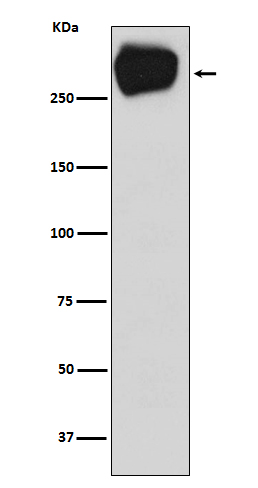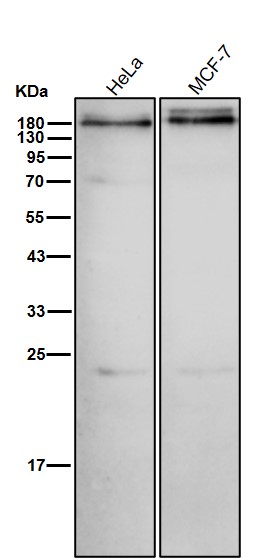

| WB | 咨询技术 | Human,Mouse,Rat |
| IF | 咨询技术 | Human,Mouse,Rat |
| IHC | 咨询技术 | Human,Mouse,Rat |
| ICC | 技术咨询 | Human,Mouse,Rat |
| FCM | 1/20-1/100 | Human,Mouse,Rat |
| Elisa | 咨询技术 | Human,Mouse,Rat |
| Aliases | ABC29; Abcc1; GSX; Leukotriene C(4) transporter; LTC4 transporter; MRP1;;ABCC1 |
| WB Predicted band size | Calculated MW: 172 kDa ; Observed MW: 171 kDa |
| Host/Isotype | Rabbit IgG |
| Antibody Type | Primary antibody |
| Storage | Store at 4°C short term. Aliquot and store at -20°C long term. Avoid freeze/thaw cycles. |
| Species Reactivity | Human |
| Immunogen | A synthesized peptide derived from human ABCC1 |
| Formulation | Purified antibody in PBS with 0.05% sodium azide,0.05% BSA and 50% glycerol. |
+ +
以下是关于MRP1抗体的3篇代表性文献,按作者和内容简要整理:
---
1. **文献名称**:*The human multidrug resistance protein MRP1: mechanistic and functional studies*
**作者**:Deeley, R.G., et al.
**摘要**:该综述总结了MRP1(ABCC1)的结构、功能及其在肿瘤多药耐药中的作用,重点讨论了利用特异性抗体检测MRP1在细胞膜上的表达及其与化疗药物外排的关联。
2. **文献名称**:*Overexpression of a transporter gene in a multidrug-resistant human lung cancer cell line*
**作者**:Cole, S.P., et al.
**摘要**:研究首次克隆了MRP1基因,并通过抗体验证其在耐药肺癌细胞中的过表达,证明MRP1通过主动外排化疗药物(如长春新碱)介导耐药性。
3. **文献名称**:*Expression of the multidrug resistance-associated protein (MRP) in acute and chronic leukemias*
**作者**:Nooter, K., et al.
**摘要**:利用抗MRP1的单克隆抗体分析白血病患者样本,发现MRP1高表达与临床化疗疗效差显著相关,提示其可作为耐药性生物标志物。
---
**备注**:
- 以上文献可通过PubMed、Web of Science等平台检索,建议结合近5年研究补充最新进展。
- MRP1抗体常用于免疫印迹(WB)、免疫组化(IHC)及流式细胞术,应用场景包括肿瘤耐药机制研究和药物开发。
The multidrug resistance-associated protein 1 (MRP1), encoded by the ABCC1 gene, is a member of the ATP-binding cassette (ABC) transporter family. First identified in 1992. MRP1 is renowned for its role in multidrug resistance (MDR) in cancer therapy. Unlike P-glycoprotein (P-gp), another ABC transporter linked to MDR, MRP1 primarily exports organic anions, including glutathione-, glucuronate-, or sulfate-conjugated compounds, and certain chemotherapeutic agents (e.g., anthracyclines, vinca alkaloids). It is broadly expressed in normal tissues, such as the lungs, kidneys, testes, and placenta, where it participates in detoxification, inflammation regulation, and endogenous metabolite transport.
In cancer, MRP1 overexpression contributes to chemotherapy failure by extruding drugs from malignant cells, reducing intracellular concentrations. Its involvement extends beyond oncology; MRP1 dysfunction is implicated in cardiovascular diseases, neurological disorders, and cystic fibrosis. MRP1 antibodies are essential tools for detecting protein expression in research and diagnostics, aiding in studies of drug resistance mechanisms, tissue distribution, and therapeutic targeting. Monoclonal and polyclonal antibodies against MRP1 are widely used in techniques like Western blotting, immunohistochemistry, and flow cytometry. Recent efforts focus on developing MRP1 inhibitors to overcome MDR, with antibodies playing a pivotal role in validating inhibitor efficacy and mechanistic studies.
×